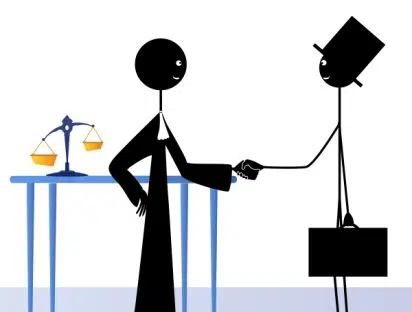Our two previous articles discussed whether the French Deferred Prosecution Agreement (named Convention Judiciaire d’Intérêt Public, below CJIP) is a genuine agreement (1). The question deserves to be raised because this agreement has been considered unbalanced, in particular as, according to the jurist Martina Galli, the defendant legal person is “called upon to decide whether or not to accept the conditions imposed by the prosecutor” (2). A first attempt at conceptualisation, using the concept of joint commitment, did not lead to the conclusion that the CJIP was a particular type of agreement. Here we explore a second possibility. It is inspired by another observation by Martina Galli, who emphasizes the interest, in order to understand this agreement, of taking into account the difference between the concepts of consent and assent.

Drawing on a comment by Jean Danet, Martina Galli observes that, “rather than consent, the term ‘assent’ better reflects the acceptance required by the law” (3). She immediately makes the following distinction: “Assent means both more and less than consent. On the one hand, the defendant accepts the sanction which they will have to adhere to in order to execute it without constraint. However, on the other hand, their assent does not condition the sanction. It is another sanction that comes about by other means, those of traditional prosecution.”
If assent “better reflects the acceptance required by the law,” it is because of the adherence to the motives of the law, to its raison d’être, and, as a consequence, in the case of the CJIP, to the financial sanction and to the obligation of the legal person to submit to a compliance programme (4).
Assent adds motivation to the formality of an agreement. By assent, the person acknowledges that the proposal of another (in this case the proposal of the public prosecutor, a proposal being defined here as “the act of presenting, suggesting, submitting to the consent of another”) is worthy of acceptance on the grounds that, for example, any reasonable (or concerned with the “public interest”) person in the same circumstances should accept it. Assent implies that the person judges such a principle (“Any reasonable person would do action A in circumstance C”) to be “right and true” (6). Martina Galli’s observation implies that the law requires this kind of judgment.
However, assent, which is part of the realm of the mind, of subjectivity, means less than consent, which, by definition, takes the form of an action – for example, the signing of a document. Consent has practical effects, notably legal, without necessarily requiring its author to adhere to the reasons for the agreement proposed to them. Thus, according to the lexicographer Jean-Charles Thibault de Laveaux, “one can give one’s consent to a thing without giving one’s assent to it; that is to say, one can, by some particular considerations, consent that it be done, without adopting the motives that commit one to doing it” (7).
Such a situation may be consistent with the CJIP: consent is manifested by a public act (the formal acceptance by the legal person of the agreement proposed by the public prosecutor), but assent (the sincere recognition of its fault and of the fairness of the sanction) may not be present. One could thus put forward an initial hypothesis explaining the imbalance attributed to the CJIP – the idea that it “does not place the parties to the transaction on an equal footing” (8) – by the existence of a dissonance between consent and assent: the legal person could consent (sign the CJIP) without assenting (without recognizing the value of the public interest).
This distinction is consistent with the conception, according to which the object of assent is a proposition (understood here in the logical sense of the statement of a state of affairs) – assent is then “an act of the mind which adheres to a proposition” –, whereas consent has as its object an action – it is “an act of the will by which one decides or even expressly declares that one does not object to a given action whose initiative is taken by another” (9). Assent depends on the faculty of understanding, consent on the faculty of will.
Applied to the CJIP, and by oversimplifying, this could give, on the assent side: “We believe that this agreement is a good opportunity,” and, on the consent side: “We want to sign this agreement.” The simplifying character of this description comes from the fact that, on the one hand, assent is confused with the concept of belief, and that, on the other hand, assenting to a proposal also denotes an act of will: we choose to accept the proposal in question – we could just as easily refuse it (10).
Let us add that this acceptance can cover a more or less strong adhesion to a proposition. It is intuitively understood and accepted that there are degrees of assent to a proposition according to the uncertainty associated with it or according to factors depending on the person themselves (11). A question of this kind has been raised, for example, in relation to the assent sought from children in the context of medical care or medical research.
In this particular case, consent depends on the quality of the information that is communicated to the child or his or her representatives, but also on their competence and decision-making capacity (12). It also presupposes formalisation, for example, as mentioned above, a signature on an official document. Assent, on the other hand, is based on less demanding conditions which take into account the possible limitation of the decision-making capacity of children (13).
Thus, (informed) consent has been defined as “an explicit agreement which requires participants to be informed about, and have an understanding of, the research,” whereas assent has been described as “an informal agreement to participate in research” (14). In short, “whereas consent presumes DMC and thus the right to make a final choice, assent acknowledges children’s active involvement in healthcare and recognizes that their decision-making abilities are developing” (15). The quality of assent varies according to their capacity for understanding and their ability to deliberate and decide. This suggests the possibility of degrees of approval of care or research.
A second hypothesis, based on degrees of assent, could thus be advanced to explain the imbalance attributed to the CJIP: the dissonance between consent and assent is a matter of degrees, and the imbalance arises from an insufficient degree of motivation in the approval of the CJIP.
Unfortunately, this new formulation says less than the first hypothesis, which resulted from the distinction between assent and consent.
Before concluding, let us consider a third hypothesis, which appeals solely to the concept of consent: the supposed imbalance of the CJIP could possibly stem from the fact that, while the defendant legal person does indeed give express consent to the agreement proposed by the public prosecutor, it does not give any consent, either express or tacit, to the principles of the law.
Such a hypothesis seems hardly credible. Indeed, it can be considered that by signing a CJIP, the legal person has not only given express consent to this agreement, but also to the principles of the law that gave rise to it.
And if one rejects this objection, one may argue that, in the absence of express consent, the legal person has tacitly consented to the principles of the law. In support of this argument, it could be argued that the fact that the legal person accepted the benefits of a CJIP implies that it consented to the principles of the Act that established the CJIP, unless the legal person publicly stated that it did not consent to the principles of the Act – but such a statement would have affected the conclusion of the CJIP in question. Alternatively, the fact that the legal person agreed to negotiate with the public authority in order to achieve a CJIP is in itself a sign that there was tacit consent of the principles of the law – in this case, it would have been difficult, if not impossible, to say: “We do not consent to the principles of the law that introduced the CJIP, even though we are in the process of negotiating a CJIP with the French judicial authorities” (16).
These arguments lead us to reject our third hypothesis. But the brief discussion it has prompted allows us to conclude our exploration: the spirit of the December 9, 2016 French Act that introduced the CJIP implies genuine consent by the legal persons involved, including consent to the merits of the law. And this double consent eliminates the idea that the supposed “imbalance” in the conclusion of this agreement is problematic.
Références
(1) See our two previous articles: “What is the meaning of “agreement” in the French Deferred Prosecution Agreement,” Part I and Part II, Blog Philosophy & Business Ethics, 30 November and 21 December 2022.
(2) M. Galli, « Une justice pénale propre aux personnes morales. Réflexions sur la convention judiciaire d’intérêt public », Revue de science criminelle et de droit pénal comparé, 2(2), 2018, pp. 359-385.
(3) J. Danet, La justice pénale entre rituel et management, Presses Universitaires de Rennes, 2010.
(4) Loi n° 2016-1691 du 9 décembre 2016 relative à la transparence, à la lutte contre la corruption et à la modernisation de la vie économique, Article 22.
(5) Grand Larousse de la langue française, tome 5, Librairie Larousse, 1989.
(6) J.-C. Thiebault de Laveaux, Dictionnaire synonymique de la langue française, Volume 1, A. Eymery, 1826.
(7) Ibid.
(8) L. Fabre, « Préservons l’équilibre de la convention judiciaire d’intérêt public », Le Monde du Droit, 5 November 2021.
(9) A. Lalande, Vocabulaire technique et critique de la philosophie, 18th ed., Paris, PUF, 1996.
(10) See (in French) Paul Ricoeur, « Croyance », Encyclopædia Universalis, Volume 5, 1968.
(11) Here we briefly allude to John Locke’s thesis on degrees of assent (Essay on Human Understanding, book IV, ch. 16).
(12) “DMC [Decision-Making Capacity] is defined as a person’s cognitive ability to manipulate information in order to reach a decision. Competence refers to the authority of a person to transform such choices into legally binding decisions within the limitations of the law.” (BIO/ENF-CP Drafting Group on Developing a Guide to good practice concerning the participation of children in the decision-making process on matters regarding their health, Council of Europe, 25 November 2021.)
(13) According to Sanford Leikin, this limitation comes from the immaturity of children, which is characterized in particular by values that “are more likely to change with time than those of an older individual” (S. Leikin, « Minors’ assent or dissent to medical treatment », The Journal of Pediatrics, 102(2), 1983, pp. 169-176).
(14) A. Graham, M. Powell, N. Taylor, D. Anderson & R. Fitzgerald, Ethical Research Involving Children, UNICEF Office of Research – Innocenti, 2013.
(15) Groupe de rédaction BIO/ENF-CP…, op. cit. It should be noted that, despite these nuances, official texts, in particular the Helsinki Declaration and a European Union Regulation, state that a child’s assent is required when he or she is capable of giving it.
(16) We draw on Arthur Isak Applbaum, Ethics for adversaries: The morality of roles in public and professional life, Princeton University Press, 1998.



